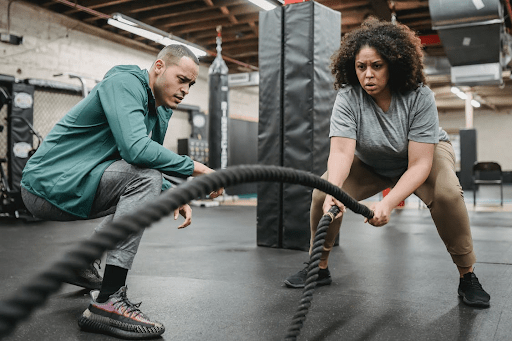
Your workout routine should be changed every six to 8 weeks to reach your fitness objectives. This allows your body the opportunity to make necessary physiological adjustments. This can happen through different intensity levels, durations, and different compositions. This helps you keep track of your progress.
Changing intensity
To avoid monotony, it is important to change your routine once in a while. If you are bored with your workouts, you may skip them or give it up. Tracking your progress can be done by keeping a training diary. You might want to modify your training routine if your progress seems slower than normal.
The rule of thumb is to train for three to four weeks. However, it can vary depending on your goals and how long you have been training. If you don't see results, you can always modify your workout.
Changing duration
There are several reasons to vary your routine. People change their routines often because they are bored or uncertain about something. But too many variations can be detrimental to your progress. It could also slow you down and prevent you from reaching your fitness goals. There are general guidelines that you can use to help.

Although there is no single answer to this question, a general rule of thumb is that you should switch up your workout routine every three or four weeks. Or whenever you feel stuck. Some people find that they are able to get better results by changing up their workouts regularly. You can also keep your mind sharp and avoid boredom by changing routines.
FAQ
Can exercise help me lose weight?
Yes. Regular exercise can help you shed extra calories and lose weight. Exercise also helps keep your metabolism up, so you continue to burn calories even when you aren't exercising.
Can I exercise after eating?
It all depends on which type of exercise you are performing. Avoid strenuous exercises after meals. It could cause stomach cramps. Light aerobic activities, such as walking or biking, are better.
Are there any exercises that I shouldn't do or should I?
Before starting any new exercise program, you should consult your doctor. Some people are unable to exercise due to injuries. Some activities also require special equipment. Swimming requires you to have a swimsuit and access to the pool.
Statistics
- Globally, 28% of adults aged 18 and over were not active enough in 2016 (men 23% and women 32%). (who.int)
- In 2018, the World Health Assembly agreed on a global target to reduce physical inactivity by 15% by 2030 and align with the Sustainable Development Goals. (who.int)
- In high-income countries, 26% of men and 35% of women were insufficiently physically active, as compared to 12% of men and 24% of women in low-income countries. (who.int)
- Adolescent girls were less active than adolescent boys, with 85% vs. 78% not meeting WHO recommendations of at least 60 minutes of moderate to vigorous intensity physical activity per day. (who.int)
External Links
How To
How to Stay Fit at Age 40
This article guides those who want to keep their body healthy and strong even at 40 years old. It covers some basic advice on how to eat right, exercise, sleep well and take care of your mental health. This article gives tips on how to live longer and healthier.
-
Eat right - It is important to eat the right food when you are trying to lose weight. You should steer clear of processed food products, and eat whole grains and fruits, vegetables, lean proteins, fish, eggs, nuts, seeds, beans and legumes. Do not eat what you don’t like. You can add another food to your daily diet. You don't have to eat a lot. This won't help you lose any weight. Try adding small amounts of different foods to your daily meal. For example, if you normally only eat chicken breast, try turkey once weekly. Or if you love pasta, try rice occasionally. Consider including these foods in your daily meals.
-
Exercise - When exercising, make sure you work out at least three times a week. Include cardio activities like running, swimming, biking and dancing. Get enough sleep. It is recommended that you get at least 8 hours sleep per night. It is important to drink enough water throughout each day. Try to drink 2 liters (0.5 gallons) of water every day.
-
Get enough sleep to stay healthy. The National Sleep Foundation says adults need at least 7-8 hours of sleep each night to maintain their physical and emotional health. Most people only get 6 hours sleep per night. If you find that you are constantly tired throughout the day, try making adjustments to your sleeping habits. You can catch more sleep by changing your sleeping schedule so that you go to bed earlier or wake up later. Turn off your phone prior to going to bed to help you wind down and relax. Avoid caffeine after noon. It can cause insomnia.
-
Take Care Of Your Mental Health - For a healthy body, it is important to take care of your mind. Stress can lead people to have poor eating habits or make poor lifestyle choices. Therefore, it's important to make sure that you practice stress management techniques such as meditation, yoga, breathing exercises, and relaxation techniques. One hour of your time should be spent doing something enjoyable. This could mean taking a walk outside, playing sports, reading a book, listening to music, watching TV, etc.
These four tips will help you live longer, and be healthier. These simple steps will help you achieve your fitness goals.